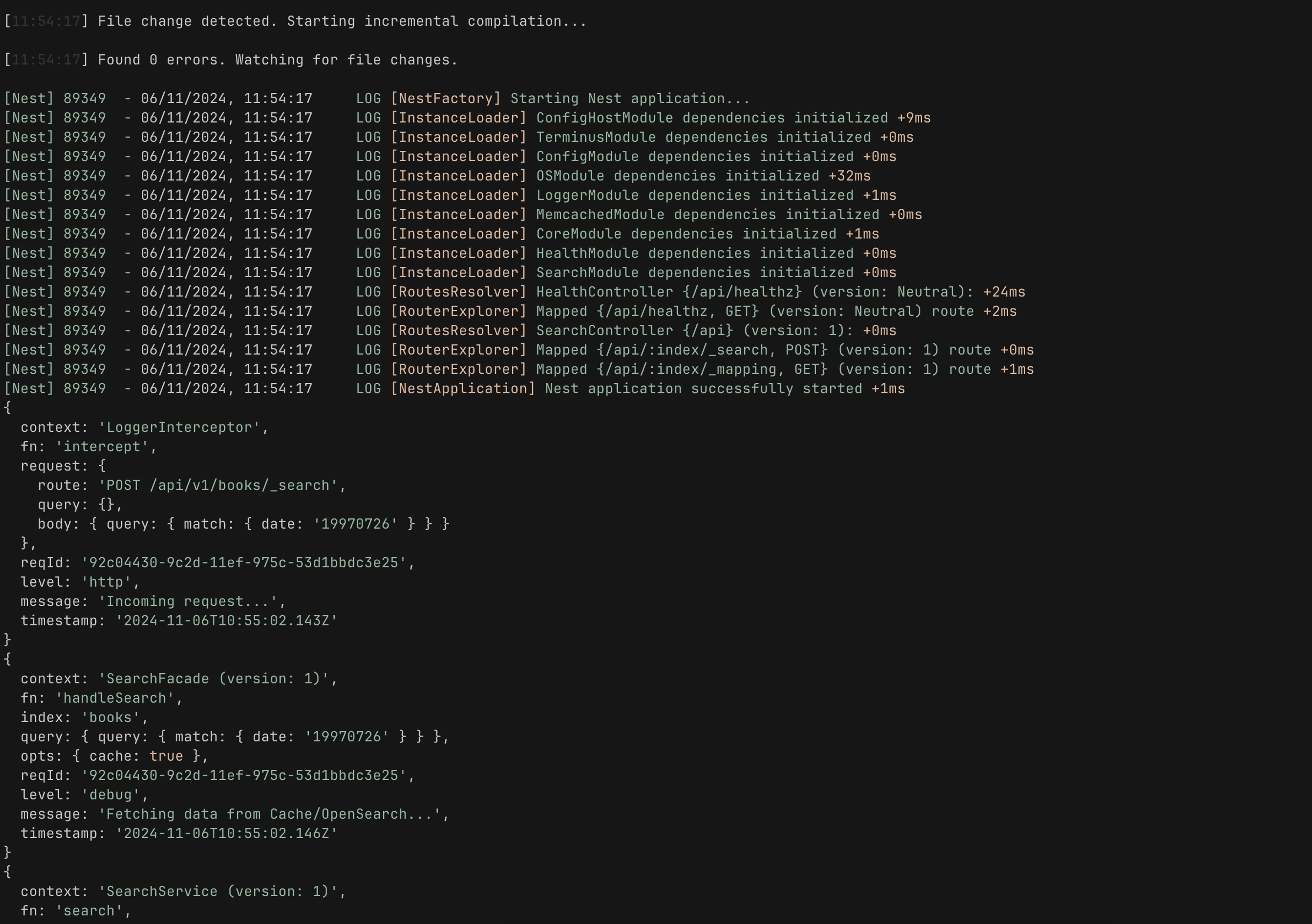Logger module and service for Nest,
a progressive Node.js framework for building efficient and scalable server-side applications.
npm install @andreafspeziale/nestjs-logyarn add @andreafspeziale/nestjs-logpnpm add @andreafspeziale/nestjs-logThe module is Global by default.
src/core/core.module.ts
import { Module } from '@nestjs/common';
import { LoggerModule } from '@andreafspeziale/nestjs-log';
@Module({
imports: [
LoggerModule.forRoot({
level: LoggerLevel.Error,
customLevelsOrder: false
pretty: true,
colorize: false,
redact: ['password'],
exclude: ['/swagger'] // Exclude routes from LoggerInterceptor
}),
],
...
})
export class CoreModule {}-
levelis optional and its default isDebug -
customLevelsOrderis optional and its default isfalse(Enables a personal levels hierarchy taste) -
prettyis optional and its default istrue -
colorizeis optional and its default istrue -
redactis optional and its default is [] -
excludeis optional and its default is []
BTW, using by using defaults you can ignore the provided schemas described in the "Environment variables management" chapter and just:
export const loggerModuleOptions = {
level: LoggerLevel.Debug,
customLevelsOrder: false,
pretty: true,
colorize: true,
redact: [],
exclude: [],
};src/core/core.module.ts
import { Module } from '@nestjs/common';
import { LoggerModule } from '@andreafspeziale/nestjs-log';
@Module({
imports: [
LoggerModule.forRoot({}),
],
...
})
export class CoreModule {}src/core/core.module.ts
import { Module } from '@nestjs/common';
import { ConfigModule, ConfigService } from '@nestjs/config';
import { LoggerModule } from '@andreafspeziale/nestjs-log';
import { Config } from './config';
@Module({
imports: [
ConfigModule.forRoot({
....
}),
LoggerModule.forRootAsync({
useFactory: (cs: ConfigService<Config, true>) => cs.get<ConfigService['logger']>('logger'),
inject: [ConfigService],
}),
],
....
})
export class CoreModule {}use the client and create your own service
src/samples/samples.service.ts
import { Injectable } from '@nestjs/common';
import {
InjectLoggerOptions,
InjectLogger,
LoggerClient,
LoggerModuleOptions,
LoggerClient,
} from '@andreafspeziale/nestjs-log';
@Injectable()
export class SamplesService {
constructor(
@InjectLoggerOptions()
private readonly loggerModuleOptions: LoggerModuleOptions, // Showcase purposes
@InjectLogger() private readonly loggerClient: LoggerClient
) {}
....
}out of the box service with a set of features
src/samples/samples.service.ts
import { LoggerService } from '@andreafspeziale/nestjs-log';
import { SampleReturnType, MyParams } from './samples.interfaces'
@Injectable()
export class SamplesService {
constructor(
private readonly loggerService: LoggerService
) {
this.logger.setContext(SamplesService.name);
}
async sampleMethod(params: MyParams): Promise<SampleReturn> {
this.logger.debug('Doing something...', {
fn: this.sampleMethod.name,
params,
});
....
}
}You'll see:
{
context: 'SamplesService',
fn: 'sampleMethod',
params: {
....,
},
reqId: '557a8e30-62e6-11ef-b821-ebc5f38e9e30',
level: 'debug',
message: 'Doing something...',
timestamp: '2024-08-25T13:31:28.843Z'
}reqId will be there as soon as you developing a backend server and:
src/main.ts
import { rTracerFastifyMiddleware } from '@andreafspeziale/nestjs-log';
async function bootstrap() {
const app = await NestFactory.create....;
....
// I usually use Fastify but feel free to use Express importing rTracerExpressMiddleware instead of rTracerFastifyMiddleware
app.use(rTracerFastifyMiddleware());
....
await app.listen....;
}
bootstrap();Use middleware in case of Express, use interceptor in case of Fastify.
At each request you'll see something like this:
{
context: 'LoggerInterceptor',
fn: 'intercept',
request: {
route: 'POST /whatever',
query: {},
body: {
....
}
},
reqId: '557a8e30-62e6-11ef-b821-ebc5f38e9e30',
level: 'http',
message: 'Incoming request...',
timestamp: '2024-08-25T13:31:28.798Z'
}src/core/core.module.ts
import { LoggerMiddleware, LoggerModule } from '@andreafspeziale/nestjs-log';
import { MiddlewareConsumer, Module, NestModule } from '@nestjs/common';
@Module({
imports: [
....,
LoggerModule....
],
providers: [....],
})
export class CoreModule implements NestModule {
configure(consumer: MiddlewareConsumer): void {
consumer
.apply(LoggerMiddleware)
.exclude('(.*)/healthz', '/swagger(.*)', '/favicon.ico')
.forRoutes('*');
}
}src/samples/samples.controller.ts
import { Body, Controller, Post, UseInterceptors } from '@nestjs/common';
import { LoggerInterceptor } from '@andreafspeziale/nestjs-log';
import { MyPayloadDTO, MyReturnDTO } from './dto';
import { SamplesService } from './samples.service';
@Controller('samples')
@UseInterceptors(LoggerInterceptor)
export class SearchController {
constructor(private readonly samplesService: SamplesService) {}
@Post()
async search(@Body() payload: MyPayloadDTO): Promise<MyReturnDTO> {
return this.samplesService.sampleMethod(payload);
}
}or
src/core/core.module.ts
import { LoggerInterceptor, LoggerModule } from '@andreafspeziale/nestjs-log';
import { Module } from '@nestjs/common';
import { APP_INTERCEPTOR } from '@nestjs/core';
@Module({
imports: [
....,
LoggerModule.... // Use the "exclude" module option to exclude routes from LoggerInterceptor
],
providers: [{
provide: APP_INTERCEPTOR,
useClass: LoggerInterceptor,
}],
})
export class CoreModule {}Please refer to @andreafspeziale/nestjs-search for more info about the environment variables features exported from my packages.
nestjs-log exports some features as well.
import { loggerSchema } from '@andreafspeziale/nestjs-log/dist/zod';
....import { LoggerSchema, ILoggerSchema } from '@andreafspeziale/nestjs-search/dist/class-validator';
....pnpm test
- Author - Andrea Francesco Speziale
- Website - https://nestjs.com
- Twitter - @nestframework
nestjs-log MIT licensed.






